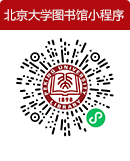在全球化与人工智能共振的时代,
电影成为我们理解科技、文化与人类命运的重要媒介。
北京大学第二十二届国际文化节
隆重推出“智影交汇,人机共生”系列观影会,
第二场活动由北京大学会议中心和北京大学国际合作部联合主办,
北京大学艺术学院、北京大学图书馆协办,
中国早期科幻类型电影探索的杰作《错位》
带你探索“科技与人”这一深刻的命题。
In an era of globalization, along with the convergence of artificial intelligence,
cinema serves as a vital medium through which we explore technology, culture, and the destiny of human beings.
The 22nd Peking University International Culture Festival is thrilled to present the film series “When Cinema Meets AI: A Journey into Human-Machine Symbiosis”.
The second event, jointly hosted by the Peking University Conference Center and the Office of International Relations,
with support from the School of Arts and PKU Library,
will take you back in time to screen the masterpiece of early Chinese sci-fi genre exploration Dislocation,
and delve into the profound topic of "Technology and Humanity."
影片概览
Film Overview
《错位》由黄建新执导,是其“先锋三部曲”中极具科幻色彩的代表作。影片讲述了一位科学家制造出与自己相貌相同的智能机器人,试图让其代替自己应对繁琐的社交与会议,却逐渐陷入身份迷失与权力反噬的现代困境的故事。在机械复制的微笑背后,是人类对自我、自由与控制的深层叩问。《错位》虽诞生于1986年,却已触及并探索了“科技与人”这一深刻的命题,以冷峻的视觉语言与哲学思辨,提前三十年预演了人工智能时代的身份焦虑,堪称中国早期科幻类型电影探索的杰作。
Dislocation, directed by Huang Jianxin, is a strikingly sci-fi masterpiece from his "Avant-Garde Trilogy." The film tells the story of a scientist who creates an intelligent robot identical to himself, intending for it to handle tedious social engagements and meetings. However, he gradually descends into an existential crisis and a modern dilemma of power backfiring. Behind the mechanically replicated smile lies humanity's profound inquiry into self-identity, freedom, and control. Though made in 1986, Dislocation delves deeply into the timeless theme of "technology and humanity," using cold, stark visual language and philosophical contemplation to presciently explore identity anxiety in the AI era—three decades ahead of its time. It stands as a groundbreaking work in the exploration of early Chinese sci-fi cinema.
导赏嘉宾
Guest Speaker
映后环节,北京大学艺术学院院长李洋将从电影美学、科技哲学与时代语境等多个维度进行导赏,引领观众剖析影片的前瞻视野与现实启示。无论您是科幻电影爱好者、科技领域研究者,还是关注“人与科技关系”的中外师生,都不妨走进讲堂,在光影中感受经典的力量,在思辨中探索科技与人性的未来方向。
Following the screening, Professor Li Yang, Dean of the School of Arts at Peking University, will provide an in-depth analysis of the film from multiple perspectives, including film aesthetics, philosophy of technology, and its historical context. He will guide the audience in unpacking the movie’s visionary insights and their relevance to contemporary issues.
Whether you are a sci-fi film enthusiast, a researcher in technology studies, or a student or faculty member curious about the relationship between humanity and technology, this session offers a unique opportunity to engage with a classic work of cinema. Join us in the lecture hall to experience the power of film art and explore the future of technology and human nature through thoughtful dialogue and reflection.
活动信息
Event Information
时间: 2025年10月21日(周二)晚6:30
地点: 百周年纪念讲堂观众厅
电影语言:中文
Time: 6:30 PM, Tuesday, October 21, 2025
Location: Auditorium, Centennial Hall
Film Language: Chinese
报名问卷二维码
QR Code for Registration

欢迎在校外籍师生报名,报名成功将获得免费电影票赠送。
名额有限,先到先得
截止时间:10月17日 12:00(周五中午12:00)
International faculty and students are welcome to register. Successful registrants will receive a movie ticket.
Spots are limited and available on a first-come, first-served basis.
Registration Deadline: Friday, October 17, 12:00 PM (noon)
从光影到书香——2025国际文化节观影会第二场延伸阅读
Beyond the screen, deepen the dialogue. Check out the AI booklist provided by PKU Library.
光影是引子,阅读是延展。在人工智能深刻影响未来的当下,高校作为创新思想的策源地,更需要以深度阅读搭建科技认知与人文思考的桥梁。北大图书馆特别策划这份人工智能主题书单,将电影与书籍、科技与人文有机融合,邀请读者在观影余韵中继续思索,在书页深处探寻科技与文明的对话。
1. 张鹂.人工智能在想什么:从科幻电影看AI未来[M].人民邮电出版社,2020.【索书号:J974.5/2 北大中心馆 艺术阅览室(西区209)】
2. 许华哲.超人类进化:从仿生到人工智能[M].机械工业出版社,2025.【索书号:TP242-49/17 北大中心馆 自然科学阅览厅(东区二层)】
3. 奥尔森(Olson,Parmy).至高无上:一场颠覆世界的人工智能竞赛=Supremacy:Al, ChatGPT, and the race that will change the world[M].中信出版集团股份有限公司,2025.【索书号:TP18/1170 北大中心馆 自然科学阅览厅(东区二层)】
4. 高新民.人工智能及其创造力:心灵-认知哲学的视角[M].科学出版社,2025.【索书号:TP18/241a 北大中心馆 自然科学阅览厅(东区二层)】
5. 郭露露.自动驾驶中的人工智能[M].机械工业出版,2025.【索书号:U463.61/48 北大中心馆 库本阅览室(西区109)】
6. 特南 (Tenen,Dennis Yi).机器如何学会写作:给人工智能的文学理论[M].东方出版中心,2025.【索书号:104-39/2 北大中心馆 文学阅览室(中文)(西区301)】
电影镜头下,复古的科幻场景与尖锐的现实追问形成奇妙碰撞
——当科技成为解放人力的工具,我们该如何守住人性的本质?
When technology becomes a means of liberation,
how do we safeguard the essence of humanity?





